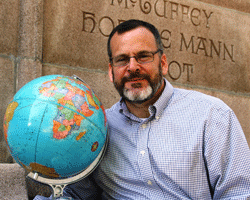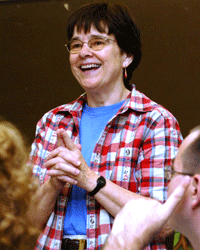Global Connections: The College of Education Goes Worldwide
(First in a series)
By John Patrick Bailey
Assistant Scholar
School of Teaching and Learning
“Teaching students about the world is not a subject in itself, separate from other content areas, but should be an integral part of all subjects taught. We need to open global gateways and inspire students to explore beyond their national borders.”
— Vivien Stewart, Becoming Citizens of the World, Educational Leadership

John Bailey, series author
Many College of Education faculty members recognize that in our increasingly interconnected and interdependent global community, it is incumbent upon academics and educational policy makers to employ an international analysis of the forces shaping educational policy and practice. This approach enhances scholarship, teaching and service by placing our work as educators in a broader context, and ensures that our students and colleagues are reflective about the impact of cultural, language, globalization and international economic and political policies on education.
This approach aligns with the University of Florida’s mission to infuse international perspectives across campus, while providing opportunities for interdisciplinary collaborations in pursuit of a robust understanding of the historical, political, social, economic and religious dimensions of education throughout the world.
To celebrate faculty and student contributions to internationalizing the College of Education, Global Connections will be a recurring column of CoE-News.
This inaugural edition will examine Dr. Linda Lamme’s International Children’s Literature course (LAE 6455).
International Children’s Literature

Professor Lamme
As a board member of the International Board of Books for Children, Dr. Lamme has been dedicated to instilling the value of cross-cultural understanding and enhanced access to children’s literature. Lamme explains the relevancy of this approach in her stated goals for the course:
“Our society is becoming increasingly multicultural and global. As Americans we tend to live in a segregated society, isolated from many of the world’s cultures. To be well prepared to teach all children about all cultures, a course that focuses upon books produced in many world cultures is relevant. Learning about important aspects of different cultures makes us more critical and sensitive readers of their literature and perhaps more sensitive to individuals of cultures other than our own. In today’s world, all children need an international curriculum.”
Three fundamental pillars of the course include:
The Partner Projects, which pairs each student with aUF international student to read, evaluate and present on children’s books. The partners examine cultural attitudes and assumptions.
Country Reports have students select a country or region from which to examine many children’s books with respect to cultural content, authors, illustrators and publishers.
Term Papers are to be in-depth analyses of critical issues in international children’s literature which have included: translation issues, cultural connections, folk tales across cultures, how children go to school in international books and war experiences of international children.
Course activities foster a collaborative approach to learning about international children’s literature, emphasizing student attitudes toward culture and literature. To learn more about LAE 6455, please contact Dr. Lamme at lammel@coe.ufl.edu.
Please look for Global Connections in the next edition of CoE-News.




